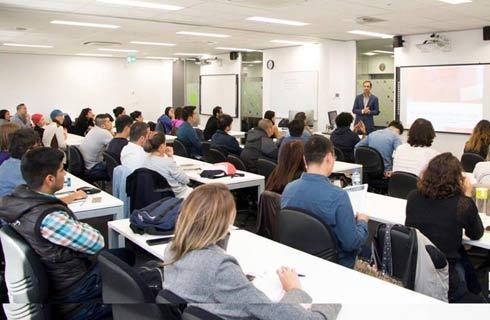- IDP China>
- 课程库>
- 社会科学>
- 社会科学>
- 应用经济学>
- Master of Arts in Applied Economics - Electricity, Natural Gas and Telecommunications Economics
经济学文学硕士-电力,天然气和电信经济学
Master of Arts in Applied Economics - Electricity, Natural Gas and Telecommunications Economics

学历文凭
Masters Degree

专业院系
Department of Economics

开学时间

课程时长

课程学费

国际学生入学条件
have earned a four-year bachelor's degree or its equivalent from a college or university that is accredited by the appropriate regional accrediting association, or do so within one academic year. A student admitted in the program must have a cumulative GPA of 3.0 on a 4.0 scale for either the last 60 hours of undergraduate coursework or any previous work in a master's program
Earn a total score of 79 on the internet-based test (iBT) Test of English as a Foreign Language (TOEFL), a 550 on the paper based TOEFL or total score of 6.5 on the International English Language Testing (IELTS)
Minimum Duolingo Score: 105
Earn a total score of 79 on the internet-based test (iBT) Test of English as a Foreign Language (TOEFL), a 550 on the paper based TOEFL or total score of 6.5 on the International English Language Testing (IELTS)
Minimum Duolingo Score: 105
IDP—雅思考试联合主办方

雅思考试总分
6.5
- 雅思总分:6.5
- 托福网考总分:79
- 托福笔试总分:160
- 其他语言考试:Minimum Duolingo Score: 105
CRICOS代码:
申请截止日期: 请与IDP联系 以获取详细信息。
课程简介
电力,天然气和电信经济学顺序是一个结构化程序,将基础经济学理论和统计方法的培训与对规制理论,历史和经济体制的专门培训相结合。学生将学习分析监管政策和传达结果的技能。此外,学生可能有机会在电信,电力或天然气行业的雇主或适当的政府机构实习,获得宝贵的实践经验。这次实习可获得三小时的学分。毕业生将获得应用经济学的硕士学位,并获得电力,天然气和电信经济学的学位。与序列相关的是监管政策研究所。该研究所提供了大学与电信,电力和天然气工业之间的重要联系。选择这个34小时顺序的学生将为在天然气,电力和电信行业的公司的经济
The Electricity, Natural Gas, and Telecommunications Economics sequence combines training in basic economic theory and statistical methods with specialized training in the theory, history and institutions of economic of regulation. Students develop skills in analyzing regulatory policy and in communicating the results. In addition, students may have the opportunity to gain valuable practical experience as an intern with an employer in the telecommunications, electric power, or natural gas industries, or with an appropriate government agency. Graduates are awarded a master’s degree in Applied Economics with a sequence in Electricity, Natural Gas and Telecommunications Economics. Associated with the sequence is the Institute for Regulatory Policy Studies. The institute provides a key link between Illinois State University and the telecommunications, electric power, and natural gas industries. Students selecting this sequence will be prepared for effective and successful careers as economists, analysts and planners with firms in the natural gas, electric, and telecommunications industries. The option is also suitable for careers with governmental agencies responsible for the regulation of public utilities, consumer advocacy organizations, and firms providing consulting and ancillary services. This is a STEM designated degree, which focuses on the systematic study of mathematical and statistical analysis of economic phenomena and problems. STEM designated degree programs offer additional benefits for students, including potential grant funded opportunities and, for international students, extended OPT study options.
The Electricity, Natural Gas, and Telecommunications Economics sequence combines training in basic economic theory and statistical methods with specialized training in the theory, history and institutions of economic of regulation. Students develop skills in analyzing regulatory policy and in communicating the results. In addition, students may have the opportunity to gain valuable practical experience as an intern with an employer in the telecommunications, electric power, or natural gas industries, or with an appropriate government agency. Graduates are awarded a master’s degree in Applied Economics with a sequence in Electricity, Natural Gas and Telecommunications Economics. Associated with the sequence is the Institute for Regulatory Policy Studies. The institute provides a key link between Illinois State University and the telecommunications, electric power, and natural gas industries. Students selecting this sequence will be prepared for effective and successful careers as economists, analysts and planners with firms in the natural gas, electric, and telecommunications industries. The option is also suitable for careers with governmental agencies responsible for the regulation of public utilities, consumer advocacy organizations, and firms providing consulting and ancillary services. This is a STEM designated degree, which focuses on the systematic study of mathematical and statistical analysis of economic phenomena and problems. STEM designated degree programs offer additional benefits for students, including potential grant funded opportunities and, for international students, extended OPT study options.
相关申请
 预科
预科 奖学金
奖学金 实习机会
实习机会 在校学习
在校学习 跨境学习
跨境学习 校园授课-线上开始
校园授课-线上开始 在线/远程学习
在线/远程学习
开学时间&学费
学费信息仅供参考,请与IDP联系以获取详细信息
| 开学时间 | 时长 | 学费 | 地点 |
|---|
本校相关课程

International Year One in Business
学历文凭
Foundation for Undergraduate
开学日期
课程费用总额


International Year One in Business
学历文凭
Foundation for Undergraduate
开学日期
课程费用总额


International Year One in Business
学历文凭
Foundation for Undergraduate
开学日期
课程费用总额


International Year One in Computer Science
学历文凭
Foundation for Undergraduate
开学日期
课程费用总额


International Year One in Computer Science
学历文凭
Foundation for Undergraduate
开学日期
课程费用总额


International Year One in Computer Science
学历文凭
Foundation for Undergraduate
开学日期
课程费用总额










 美国
美国
